November Special Section



The holiday season is a great time to take steps to look and feel your best. Now is the time to improve your beautiful smile and your oral health. Surveys show that your smile and your teeth are one of the first things that people notice about you. A smile with balanced proportions makes you look young and healthy and feel confident meeting new people and talking and laughing with friends and family.
Modern dentistry offers many options to improve your smile that are conservative, non-invasive, and affordable.
Tooth Whitening – Years of stain and discoloration can be reversed with our in-office and take-home prescription whitening procedures.
Cosmetic Recontouring - A simple process of re-shaping the teeth to eliminate chips and broken teeth can make them look healthier and much straighter.
Teeth Straightening - Creating straighter teeth and a healthier bite. With the latest advances in clear aligner therapy, Invisalign gives you an

attractive smile in a very short amount of time, without having unsightly metal braces and wires on your teeth. The latest materials allow the teeth to be gently and comfortably repositioned in just a matter of months.
Cosmetic Bonding - With the use of tooth-colored materials, we can repair

chips and cracks and make your teeth appear normal, natural and vibrant again.
Porcelain Veneers - A minimally invasive procedure which allows us to use thin shells of porcelain. These act like new enamel for your teeth. Porcelain veneers allow you to change the color,
size, shape, and position of your teeth. They are your teeth, only better. Porcelain veneers are bonded to the front of your teeth to change your smile and give you the smile of your dreams.
Botox and Juvéderm - These are safe and proven materials for therapeutic and cosmetic improvements to your lips and face. They can rejuvenate your smile in a matter of days.
Dr. Bradley Hepler and the experienced team at the Atlanta Center for Dental Health provide all the modern advances that contemporary aesthetic dentistry offers. You will realize immediate results with non-invasive and often inexpensive procedures to enhance your smile. If you would like a complementary consultation to discover your smile enhancing options, please call the Atlanta Center for Dental Health at 770-992-2236. Dr. Bradley Hepler has spent many hours dedicated to perfecting and updating the latest and best techniques in dentistry. It is with this breadth of knowledge that they provide each patient with the perfect solution to their situation, their life, and their goals. It is our great pleasure to serve this community and help as many people as possible live their best life.

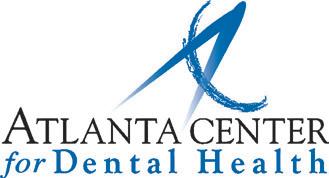
If you are one of the 85% of the population allergic to poison ivy, you might feel some resentment, indignation or even dare I say animosity toward this plant. However, the scientist in you might take a moment to marvel at just how effectively it has managed to discourage us from touching it – let alone eating it.
Urushiol is the reason you won’t find poison ivy for sale at the local grocery store or in your Caesar salad. Urushiol is an oil found within poison ivy, and it makes one’s immune system go haywire.
Many plants attack us with thorns, stinging appendages, a hail of coconuts or verbal insults. Not poison ivy. Poison ivy uses our own immune systems against us to pack a delayed but far more powerful punch. The oil of poison ivy is a relatively simple and small ringshaped molecule that can easily penetrate our skin. The oil is so small that it can slip in easily and undetected. Once in our skin, urushiol chemically reacts with and attaches to our own cell’s proteins. In so doing, the oil stealthily plants a flag on our cells that tells our immune system that our own cells are enemies.
Our bodies have a type of white blood cell called a T cell whose job is to circulate and look for viruses, bacteria and other foreign invaders. T cells have proteins on their surface that detect whether what they contact is “self” or “non-self.” In general, T cells assume that “non-self” needs to be attacked. The T-cell doesn’t recognize your own healthy cells as “self” when those cells have reacted with urushiol. Your own T cells start attacking your otherwise healthy skin. Itching, blisters and misery result.
The brilliance of poison ivy’s strategy is that the oil doesn’t depend on a certain protein or certain molecule
being present in our bodies. If that were the case, our bodies might have easily learned how to avoid a poison ivy reaction. Instead, poison ivy oil can theoretically react with just about any protein that your cells contain, and every one of these combinations is going to look different and dangerous to the T cell. It’s a strategy that has defied effective solutions. Once the oil has had time to be absorbed into your skin, your goose is cooked.
When a small molecule can attach to a larger molecule and result in a combination that elicits an immune response, the small molecule is called a “hapten.” So poison ivy oil is a “hapten.” Most examples of haptens are accidental haptens. For example, penicillin is made by certain mold species to help them fight off bacteria. When we use penicillin as an antibiotic, a small number of people will develop an allergy. Rarely, when penicillin breaks down, it reacts with some of our proteins and creates a hapten-self protein combination similar to that of urushiol and a self-protein. But this is not penicillin’s purpose.
In contrast, poison ivy oil is a hapten by design. The plant developed a chemical that flags our own cells for destruction and turns our immune system against us.
Scientists are working on a vaccine to poison ivy. A compound similar to urushiol is being studied by researchers at the University of Mississippi and by a company called “Hapten Sciences.” Perhaps one day people can frolic through poison ivy without the next day regret.
Until a vaccine comes to fruition, avoidance is your best bet. Learn to identify poison ivy and poison oak. Wash with soap and water immediately and change your clothes if you think you have accidentally had contact with these plants. And if you do develop a rash, your dermatologist is at the ready with effective treatments.


Dr. Brent Taylor is a Board-Certified Dermatologist, a Fellowship-Trained Mohs Surgeon, and is certified by the Board of Venous and Lymphatic Medicine in the field of Vein Care.
He is an expert in skin cancer and melanoma treatment, endovenous laser ablation, minimally invasive vein procedures and cosmetics procedures such as Botox and injectables.
Kathryn is a certified physician assistant with over 23 years experience as a Dermatology PA and cosmetic dermatology.
Her specialties include general dermatology such as acne, eczema, rashes, hair loss, full body skin exams, abnormal growths etc. Kathryn also specializes in cosmetic dermatology including lasers, injectables, micro-needling, PRP, facial peels, sclerotherapy for spider veins and at home skin care.
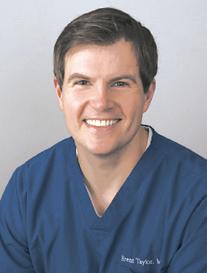
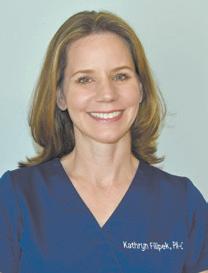

Learning that you have a heart or vascular condition can create more questions than answers. What treatment is available? Is there more than one option? What will happen if I forgo treatment?
Deciding how to proceed can be stressful, and many patients feel tempted to go with whatever their doctor recommends. But at times like this, it’s essential to step back, take a deep breath and get a second opinion.
Receiving a second opinion as part of your heart and vascular care is critical because the medical world is becoming increasingly complex. A second opinion can help you understand your options before you make a momentous decision about your health and future. It can reveal new treatment possibilities. Or, if the second opinion is the same as the first, it can help you feel more confident about your diagnosis and treatment plan.
Deciding whether to seek a second opinion can be emotional for some people. They worry they will hurt their doctor’s feelings or experience information overload. The fact is that second opinions are common in
heart and vascular care. Doctors themselves seek a second opinion when they face a complex diagnosis. They know a second opinion can make the difference between life and death – especially when your heart is involved.
second opinion can provide new hope
Your current doctor has your best interests at heart but may not know about the latest surgical and nonsurgical therapies for your condition. They may mistakenly tell you that you don’t have any treatment options or guide you to therapies that are unlikely to help.
Heart and vascular specialists at Emory Healthcare have a national reputation for treating both common and complicated heart conditions. Our highly specialized teams have advanced training and expertise in medical, surgical and interventional cardiology. They can enroll patients in clinical trials that provide access to novel technologies and treatments that are not widely available. As a result, Emory Heart & Vascular offers more treatment options for the full range of heart and vascular conditions than many other institutions worldwide.
The Second Opinion Process at
Obtaining a second opinion at Emory Heart & Vascular is straightforward. Before your appointment, our team will review your previous medical records. Multiple physicians will discuss possible treatment options. They will reach a consensus about what options offer the most promise. During your office visit, they will share their recommendations with you. You can ask questions and decide with your care team how to proceed.
If you or someone you care about needs a second opinion for a heart or vascular condition, turn to doctors at the top of their field. Emory Heart & Vascular brings together more than 150 physicians and 18 specialized programs in cardiology, cardiothoracic surgery and vascular surgery.
Next-day new patient cardiology appointments are available at one of our 24 locations.
Visit emoryhealthcare.org/transform to learn more.

Our expert heart & vascular team pioneers the most innovative techniques and treatments. Giving you more options and better outcomes than anywhere else. To make more “tickle monster!” moments like this possible.
The difference? Emory Women’s Center at Johns Creek uses research and innovation in health to provide exceptional care, close to home. From routine gynecology and menopause management, to high-risk pregnancies and specialty care, our team is here for your journey no matter where it takes you.
Visit emoryhealthcare.org/history to schedule an appointment.
Visit emoryhealthcare.org/women to schedule an appointment.





Cancer is a scary diagnosis. We know that cancer occurs as a result of the body’s own cells becoming so worn down and damaged that they must mutate in order to survive. As these mutated cells grow, they form a tumor. If untreated, cells can escape the tumor and spread to other areas of the body. This process of cancer formation and spread is quite detailed, which suggests that the treatments we use for cancer should be detailed as well. Mainstream treatments such as surgery, chemotherapy, and radiation are important, but on their own they
leave many key details unaddressed. This is one reason why we are continuing to lose the war on cancer. If we truly want to improve our cancer treatment outcomes, we must broaden our horizons and incorporate a wider variety of treatments. For this reason, I have created several resources, including my award-winning podcast, The Cancer Secrets Podcast, as well as my bestselling book, Cancer Secrets, now in its second edition. I have also released a book, Fasting from Cancer, which takes a deep dive into cancer nutrition. Finally, I have created Cancer Secrets University, an online cancer course for patients and their families. I consider these essential

Primary care spans all health care needs from the annual wellness exam, sports and preop clearance, vaccinations, through the management of chronic conditions such as Type 2 Diabetes, Fatty Liver, High Blood Pressure, Heart Disease, Chronic Kidney Disease, COPD. In the realm of men’s and women’s health, a focus on each stage of life is tailored to the individual.
The team of physicians, nurse practitioners, physician assistants, medical assistants, and staff focus on each detail of your care experience: from the first phone call to schedule your appointment, to checking in with familiar staff you come to know well, through the doctor’s visit and after care. Results of labs or X-rays are communicated in a timely manner and there is coordination of administrative issues, including prescription management, and prompt referrals.

Brought to you by – Will Goodwin, M.A, Summit Counseling Center

Every relationship encounters moments where one partner’s preferences, habits, or traits don’t perfectly align with the other’s. In these moments, partners often face a choice: Should I foster acceptance for this characteristic, or should I comply with their desire for change? Both paths have benefits—and drawbacks.
The Power of Acceptance

In short, a medical home becomes a patient’s point of care committed to helping you live healthier, longer, and better.
Same day appointments when you are sick ensure you are cared for by your regular doctor, vs an urgent care and someone unfamiliar with you.

Alpharetta: (678) 205-9004 | 3180 North Point Pkwy | Suite 303 | Alpharetta, GA - 30005
Johns Creek: (770) 622-9002 | 3890 Johns Creek Pkwy | Suite 120 | Suwanee, GA - 30024

Dr. Shruti Patel is a board-certified Internal Medicine Physician with a special interest in geriatric care, hypertension, and diabetes management. She is passionate about providing comprehensive, patient-centered care with a focus on chronic disease management and preventative health.
With over a decade of experience, Dr. Patel is eager to help patients achieve healthier and more fulfilling lives through evidence-based practices and compassionate guidance.
Her clinical approach emphasizes building strong patient relationships, empowering individuals to take an active role in their health and addressing the unique needs of patients.
Outside of medicine, she enjoys spending time with her family, traveling, and exploring wellness practices that integrate mind and body.
Acceptance means embracing a partner’s differences without trying to change them. Research from the Gottman Institute shows that many relationship conflicts are “perpetual,” meaning they stem from core personality differences that are unlikely to change. In these cases, fostering acceptance promotes emotional safety, reduces resentment, and builds longterm respect.
Pros:
• Reduces unnecessary conflict
• Builds emotional closeness and understanding
• Encourages authenticity Cons:
• Unmet needs may fester
• Some behaviors (e.g., poor communication, unhealthy habits) may harm the relationship if left unaddressed
The Role of Compliance or Adjustment
Compliance—adjusting your behavior to meet your partner’s preference— can be an act of love and compromise.
It’s often necessary in areas like household responsibilities, intimacy, or shared values.
Pros:
• Shows care and commitment
• Helps meet your partner’s needs
• Can resolve solvable problems Cons:
• If done at the expense of your authentic self, it may breed resentment
• Over-compliance can create imbalance or loss of personal boundaries
• May inhibit the development of deeper understanding for your partner’s needs
Finding the Middle Ground
Healthy relationships often require both acceptance and adjustment. The key is knowing which differences are core to your partner’s identity—and worthy of acceptance—and which are flexible enough to navigate through compromise.
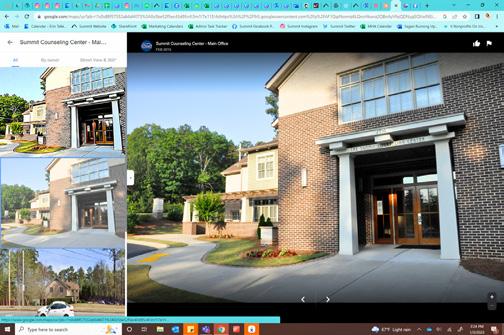

Jignesh Dholaria
Advance directives aren’t just for the elderly or the seriously ill. They’re for anyone who values autonomy, clarity and peace of mind. These legal documents, which include a living will and a healthcare power of attorney, ensure your medical preferences are honored if you’re ever unable to speak for yourself.
Why does this matter for younger adults? Emergencies don’t discriminate by age. A car accident, sudden illness or unexpected surgery could leave anyone temporarily incapacitated. Without an advance directive, loved ones may be forced to make difficult decisions without knowing your wishes—often under immense emotional stress.
Advance directives do more than protect your voice—they protect your family. They eliminate guesswork, reduce conflict and provide a clear roadmap for care. Whether you prefer aggressive treatment or comfort-focused care, documenting your choices means they will be respected.
Anyone you trust to make decisions on your behalf can be your designated healthcare proxy. This person becomes

your advocate, aware of your values and instructions. It’s a role that requires clarity and trust, and it’s best chosen before a crisis arises.
Importantly, advance directives are flexible. You can revise them as your life, relationships and medical views evolve. They’re not just about end-of-life scenarios—they’re about any moment when your voice might be silent.
To get started, talk with your primary care clinician. They can help you understand your options, guide you through the process and ensure your choices are documented properly. It’s a simple conversation that can make a profound difference.
Having an advance directive is not just responsible—it’s empowering. Whether you’re 25 or 75, healthy or managing a condition, now is the time to start the conversation. The best time to make your wishes known is before you need them. Visit wellstar.org/acp to learn more about advance care planning. To schedule a primary care appointment with Dr. Jignesh Dholaria, visit wellstar.org or call


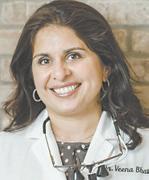




At Wellstar, you’ll find lifelong primary care partners committed to every aspect of your well-being, at every stage of life.
Your primary care team knows your complete health history—with ready access to our integrated system of specialists, imaging facilities, labs and hospitals. We’ll help you get the best treatment, right when you need it. From preventative care and screenings to acute and chronic illness management, the expert clinicians at Wellstar personalize your wellness plan to your unique needs, putting you at the center of your own care. wellstar.org/primarycare


• Spa-Like Relaxing Atmosphere
• Free Nitrous Oxide and Oral Conscious Sedation
• Cone Beam 3D Radiography
Digital Scanner – No More Gooey Impressions
• Botox and Dermal Filler
Master Injector
• Platinum Invisalign Provider


Most people expect dental insurance to work like medical insurance: pay monthly premiums and be protected from large, unexpected bills. In reality, dental insurance is built very differently. It isn’t a catastrophe safety net—it’s essentially a prepaid discount plan with a small, set annual benefit. That’s why many people are surprised when significant treatment isn’t “covered.”
Most dental plans limit what they’ll pay each year, typically between $1,000 and $2,000. Once you reach that number, the plan stops paying regardless of what care you still need. Medical insurance usually flips that model: after you meet your outof-pocket maximum, coverage expands. With dental insurance, the ceiling is on the insurer’s payout, not on your costs.
Many policies haven’t changed their reimbursement fee structure since the 1960’s and still follow an old 100/80/50 schedule—preventive care at 100%, basic care at 80%, and major care at 50%—only until the annual maximum is hit. Deductibles, waiting periods, frequency limits, “missing tooth” clauses, and downgrades (for example, paying at the rate of a silver filling instead of a tooth-colored composite) further reduce the contribution.
If you need a root canal and crown totaling $3,000, 50% coverage suggests $1,500 from insurance. In practice, after deductibles, downgrades, and earlier hygiene visits count toward your annual max, the plan often hits its $1,000–$2,000 cap quickly, leaving the rest to you. Your oral health needs don’t pause at the cap—only the plan’s payments do.
So, is it really “insurance”?
True insurance pools risk for rare, high-cost events. Dental conditions are common and largely preventable, so dental plans are designed to emphasize maintenance—cleanings, exams, and Xrays—rather than absorb the full cost of complex care. Think of dental insurance as a coupon with rules, not a blank check for treatment.
Where dental insurance helps
Most plans reward prevention. Two “healthy-mouth” cleanings, exams, and routine X-rays are often covered at or near 100%. Using these benefits consistently helps catch issues early, when they’re sim-

pler and less expensive to treat.
A simpler, more predictable choice: our in-house Wellness Plan
If you prefer transparency over fine print, our Wellness Plan replaces uncertainty with clear value:
• Professional cleanings included
• All X-rays included
• Doctor exams included
• Plus 15% off any needed restorative treatment
Because it’s our plan, not a third-party policy, your care isn’t dictated by exclusions or downgrades. There are no rejected claims, no enrollment windows, no waiting periods, no racing the calendar, and no shrinking annual maximum. You and your dentist decide what’s best; the Wellness Plan makes it more affordable.
Tips to maximize value either way
• Know your numbers: annual maximum, deductible, waiting periods, frequency limits, and coverage percentages.
• Time your care: for larger cases, phasing across benefit years can stretch limited dollars.
• Use tax-advantaged funds: Use HSAs/ FSAs to lower your net cost.
• Choose quality, not just “in-network”: materials, precision, and durability matter.
Bottom line: dental “insurance” is a small yearly benefit with limits. Our Wellness Plan makes preventive care simple and takes 15% off restorative treatment so your decisions are guided by health—not caps and clauses.
At Roswell Dental Care, we offer the best of both worlds: we’re fee-for-service and will file out-of-network claims to help you maximize any insurance benefits if you choose that instead of the Wellness Plan. Dr. Hood and her team personalize care, ensure you feel confident before treatment begins, and for added comfort we offer FREE nitrous oxide. Call 770-998-6736 or visit www.roswelldentalcare.com to start your path to comfortable, confident oral health.

The approaching holiday season is a time for celebration, family gatherings, and joy. It can also bring unique challenges for older adults, individuals with chronic illnesses, and those recovering from medical procedures.
Over the holidays we all experience increased social demands, but the hustle and bustle of holiday activities can be overwhelming for those with limited mobility or health concerns. Winter weather and shorter daylight hours may increase fall risks or make transportation difficult for seniors. Disruptions to regular schedules can affect medication management, nutrition, and emotional health. Feelings of loneliness or isolation can intensify as holiday stressors mount, especially for those living alone or far from family.
Here are some signs that can help you understand when support with the activities of daily living is needed to ensure the safety, well-being and happiness of your older loved one.
• Difficulty Managing Daily Tasks: Trouble with cooking, cleaning, personal hygiene, or getting dressed may signal the need for assistance.
• Health and Medication Issues: Missed doses, confusion about prescriptions, or noticeable decline in health could mean support is necessary.
• Mobility Challenges: Difficulty moving around the house, using stairs, or increased risk of falls.
• Changes in Behavior: Withdrawal from social activities, mood changes, or increased anxiety and depression.
• Neglected Home Environment: Unkempt living spaces, spoiled food, or piles of unopened mail might indicate that help is needed.
Discussing the need for in-home care can be sensitive. Approach the topic with empathy, focusing on the benefits rather than limitations. Use holiday plans as an opportunity to observe your loved one's needs and gently suggest extra help to make celebrations more enjoyable for everyone.
At Home Helpers we know that inhome care is not just about meeting immediate needs, it’s about creating peace of mind. Aging in the warmth and comfort of home is the preference of most seniors, and care that makes a difference is based on a wonderful match of a skilled, heart centered caregiver and the hands-on attention of a dedicated team with depth and skill. Your caregiver can assist with all personal care, help around the house, accompany you on doctor’s visits and provide specialized care for Alzheimer’s, Parkinson’s, etc.
When home is in an assisted living community, in-home care provides a bridge with immediate response to your care needs if you experience an increased fall risk, changing health condition or need to recuperate from a procedure. Your caregiver can help you remain in the setting and with the friends and lifestyle you want.
We’re here to help, from six hours a day, several days a week to 24/7 care. For a free consultation, please call Home Helpers of Alpharetta and North Atlanta Suburbs at (770) 681-0323.






Custom
Targeted
Personalized
Optimized

Peptides may sound like something straight out of a science fiction movie (and with names like BPC-157, they could easily pass for your car’s tag number), but these tiny amino acid chains are making a massive impact in modern wellness. Peptides are essentially short strings of proteins that act as messengers, telling your body to repair, regenerate, and perform at its best.
Their growing popularity comes from one simple truth—peptides work. They’re precise, highly targeted, and can trigger specific benefits without the side effects of traditional medications. From improved recovery and energy to sharper focus and better sleep, peptides are the “biohacker’s toolbox” for optimizing health at the cellular level.
Two of the biggest stars in the pep -
tide lineup are NAD+ and BPC-157. NAD+ (nicotinamide adenine dinucleotide) isn’t technically a peptide, but it’s earned honorary status thanks to its critical role in cellular energy and longevity. It supports mitochondrial function, boosts metabolism, enhances focus, and can even improve mood and sleep. Think of NAD+ as the fuel additive your body’s engine didn’t know it needed.
BPC-157, short for “Body Protection Compound,” is a powerhouse for healing. Derived from a naturally occurring protein in the stomach, it accelerates tissue repair, reduces inflammation, and helps with everything from joint pain to gut health.
So while their names might sound a little odd, peptides are proving to be high-performance upgrades for the human body—helping people recover faster, age better, and feel stronger than ever.
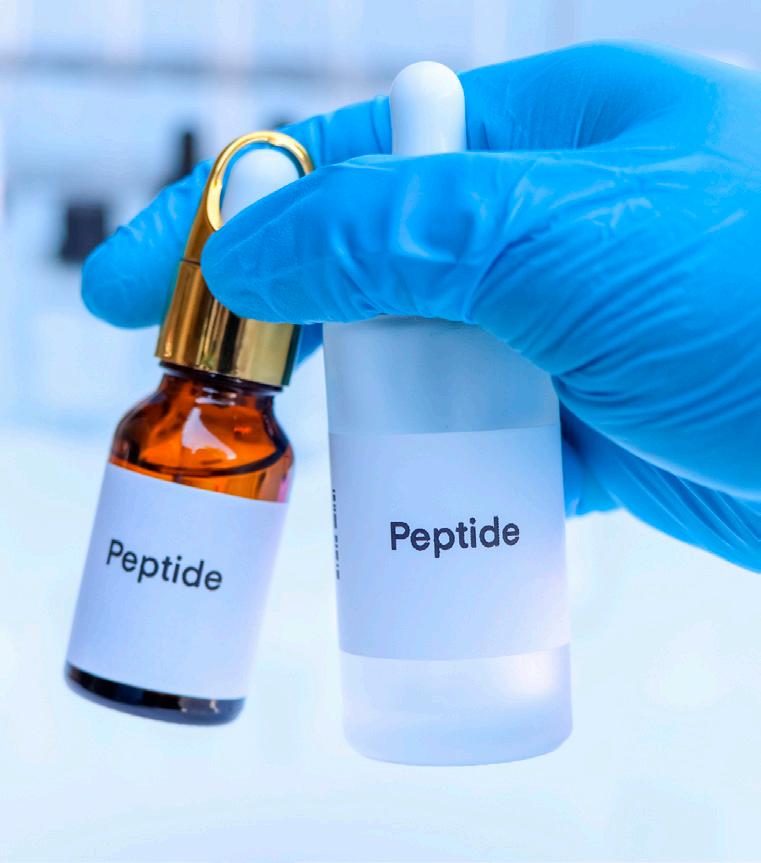

Brought to you by - North Fulton Rheumatology
Are joint pain, stiffness, or fatigue holding you back? At North Fulton Rheumatology, we specialize in diagnosing and treating autoimmune and musculoskeletal conditions like arthritis, lupus, gout, and fibromyalgia. Our board-certified rheumatologists provide personalized care designed to reduce pain, restore function, and help you live your best life. Conveniently located in Roswell, Georgia, we offer the latest treatments and advanced medications.
At North Fulton Rheumatology, we focus on compassionate, patient-centered





Local news is vital for staying informed and connected, and through this collaboration, we’re making it easier than ever. Now, you can access timely updates and our stories about the things happening in your area, all while engaging in meaningful conversations with real neighbors.
Don’t miss out on the stories that matter most to you –join us on your favorite social media platform to stay connected with everything that’s happening. Together, let’s build stronger, more informed communities!

care tailored to your unique needs. Don’t let joint discomfort slow you down—take the first step toward feeling better today.
Call 770-619-0004 | Visit www. northfultonrheumatology.com
North Fulton Rheumatology –Where Your Mobility Matters
North Fulton Rheumatology diagnoses and treats patients suffering from various types of arthritis and other autoimmune or connective tissue disorders. We are committed to providing comprehensive and compassionate care, and we use the highest, most progressive medical standards.
North Fulton Rheumatology diagnoses and treats patients suffering from various types of arthritis and other autoimmune or connective tissue disorders. We are committed to providing comprehensive and compassionate care, and we use the highest, most progressive medical standards.
Our board-certified physician, Dr. Ciela Lopez-Armstrong, and board certified nurse practitioner, Maria Betancur, AG-ACNP are qualified to manage all autoimmune and connective tissue diseases, including:
Our board-certified physician, Dr. Ciela Lopez-Armstrong, and certified family nurse practitioner, Heather Grafton, DNP, FNP-C, are qualified to manage all autoimmune and connective tissue diseases, including:
• Rheumatoid arthritis
• Rheumatoid arthritis
• Osteoarthritis
• Osteoarthritis

• Systematic Lupus
• Systematic Lupus
• Scleroderma
• Scleroderma
• Vasculitis
• Vasculitis
• Gout
• Gout
• Sjogrens
• Sjogrens
• Psoriatic Arthritis
• Psoriatic Arthritis
• Ankylosing Spondylitis
• Ankylosing Spondylitis
• Fibromyalgia
• Fibromyalgia
• Osteoporosis
• Osteoporosis
• Osteopenia
• Osteopenia


11685 Alpharetta Hwy, Suite 170, Roswell, GA 30076 Monday - Thursday, 9 a.m. - 5 p.m., Closed on Fridays P: 770-619-0004 | F: 770-619-0252 northfultonrheumatology.com
1300 Upper Hembree Road, Building 100, Suite A, Roswell, GA 30076 Monday - Thursday, 9 a.m. - 5 p.m., Closed on Fridays P: 770-619-0004 | F: 770-619-0252 northfultonrheumatology.com
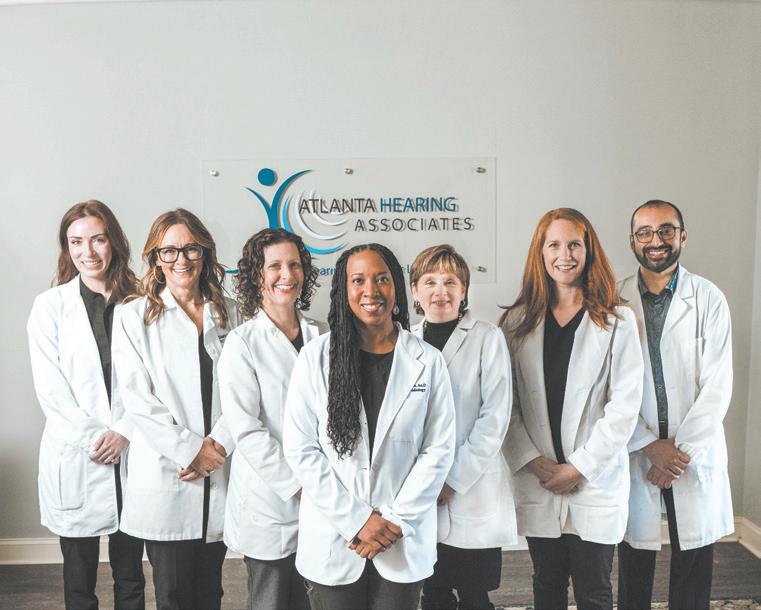



























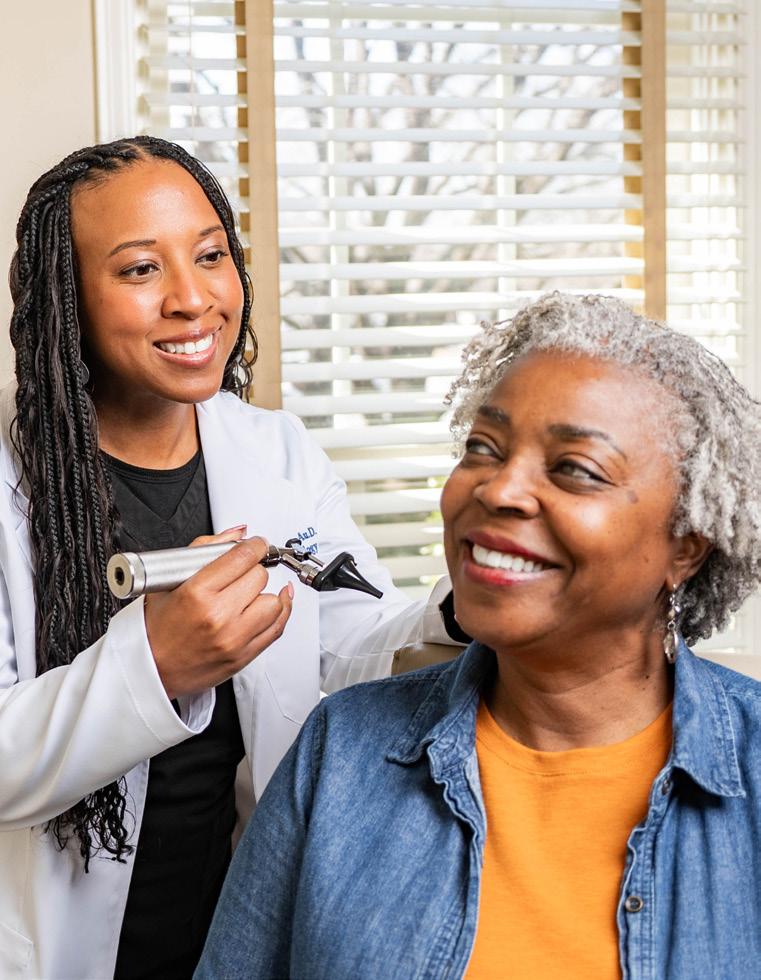
Atlanta
Atlanta Hearing Associates is a large audiology practice that encompasses 5 different locations throughout Georgia. Our offices provide comprehensive hearing tests, tinnitus assessments, ear cleaning, and hearing devices for all ages.
Every doctor you will meet is focused on your needs as a patient and works with every manufacturer to provide
a personalized fitting. Each location utilizes state of the art technology and family-oriented care to help guide our patients to the best hearing devices and information on hearing healthcare.
We also partner with different agencies to provide audiological care to veterans, ATF officers, reservists, police departments, Cochlear implants recipients, and community wellness groups.
We accept all major insurances for patients who have a hearing healthcare benefit that they are eligible to use.
Our offices are located in Atlanta, Decatur, Dunwoody, Lake Oconee, and Milledgevile.
Brought to you by – Dr. Kehinde Olumesi, Epiphany Dermatology
As we move deeper into fall here in Atlanta, many patients notice that their skin feels different—and not always in a good way. The cooler, drier air of November often intensifies dryness, making skin feel tight, flaky, and more sensitive. At the same time, fine lines, wrinkles, and areas of pigmentation tend to look more noticeable when the skin is dehydrated and lacking its natural glow.
This is the perfect time to check in with your skin and give it the care it deserves. A visit with your board-certified dermatologist can help identify whether your dryness is seasonal or tied to an underlying condition like eczema and ensure you’re using the right products and treatments to restore hydration and balance.
For those looking to address the more visible signs of aging that become pronounced this time of year, we also offer cosmetic options to refresh and rejuvenate your appearance. Treatments like BOTOX® Cosmetic can soften expression lines, while laser rejuvenation can target uneven tone, pigmentation, and texture for a smoother, more youthful complexion. Combined with medical-grade skincare, these solutions can both protect your skin and enhance your confidence heading into the holiday season.
Your skin changes with the seasons, and your care should too. This November, take proactive steps—both medical and cosmetic—to keep your skin healthy, hydrated, and radiant all winter long.
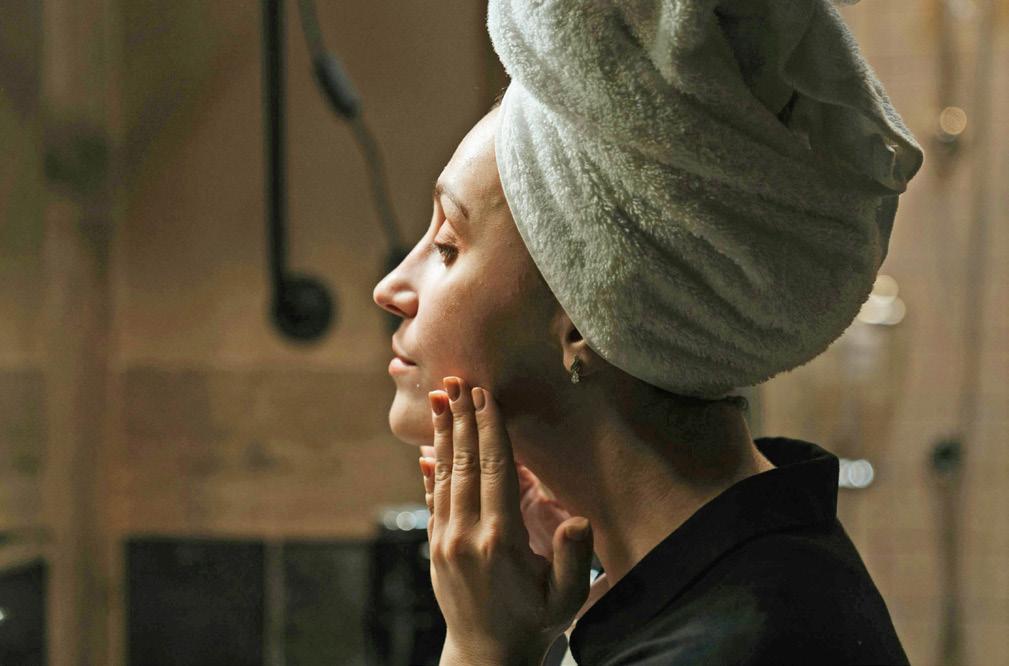
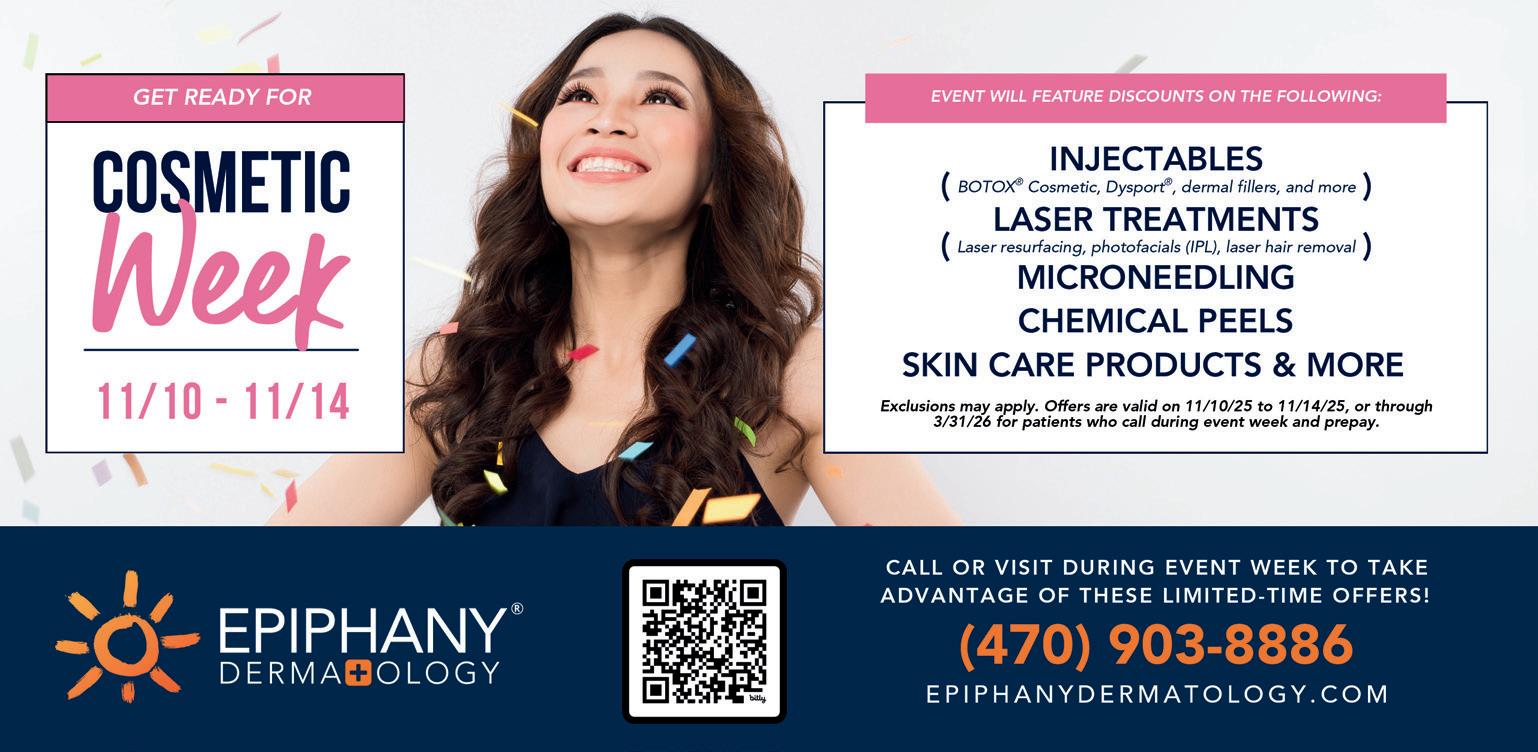










T:\ADS_2025\Appen Media Group\Filler Ads\ Shop, Eat, Read Local





Brought to you by – Mobility Plus Alpharetta
Mobility Plus Alpharetta is humbled by earning a top spot in the Best of North Atlanta rankings during its’ third year in operation!
This family-owned small business, owned by Scott and Mary Block of Alpharetta offers a customer-focused experience for those needing powered or manual wheelchairs, mobility scooters, stairlifts, lift recliners, walkers, portable and modular ramp systems or home health items.
Mary, a former Fulton County teacher, was led to working with seniors after caring for her father. She quickly realized how difficult it was to find informational resources, products and support services. When seeking a professional change, she wanted to address some of the deficits that she had previously encountered by offering as many products as possible under one roof, and by serving as a community educational resource.
The Blocks partner with local experts like move managers, senior living placement specialists, and occupational therapists to be as informed as possible about the variety of needs that their customers have. They host lunch and learns in their 3500 sq. ft. Space on a variety of topics once a quarter. “No one that comes in for a wheelchair, stairlift, or ramp, needs just that one item. Our customers are seniors, children supporting aging parents, or those living with chronic degenerative diseases. There are always other needs besides a product purchase” says Mary.
They look forward to serving the North Atlanta community for many years to come and are so grateful for your votes, and support!































